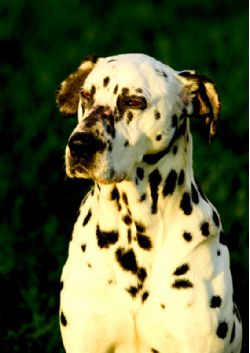Dalmatian Dog Breed
Aliases: Fire Engine Dog,
 |
|
| Life Span: | 11 and 16 years |
| Litter Size: | 7 to 9 puppies |
| Group: | Non-sporting group. |
| Recognized By: | CKC, FCI, AKC, ANKC, NKC, NZKC, APRI, ACR |
| Color: | You may easily recognize the Dalmatian because of the characteristic spots on its coat. These spots are usually brown, black, or a lighter lemon color. |
| Hair Length: | Short |
| Size: | Large |
| Shedding: | Moderate Shed |
| Male Height: | 27 inches |
| Male Weight: | 70lbs |
| Female Height: | 19 to 24 inches |
| Female Weight: | 45-65 lbs |
| General info courtesy of terrificpets.com. Additional information about this breed can be found on their website. | |
Thyroid Disease - High Risk
The Dalmatian ranks #11 among all breeds for autoimmune thyroiditis prevalence. There is a high risk of obtaining a dog that will develop thyroid disease. For this reason you should make sure you, or your breeder, are testing all dogs before breeding. It may even be a good idea to test dogs that you don't plan on breeding so that any instance of disease can be traced back to breeding pairs and eliminated.
| Rank Among Breeds | Number of Dogs Tested | Percent of Dogs With Disease |
| #11 | 3194 | 16.3% |
You can download the full report (on all breeds) by the Michigan State University Diagnostic Center for Population and Animal Health. Here
Other Health Problems
Two major health issues that are associated with Dalmatians are deafness and kidney stones. While most litters will not contain any deaf puppies, up to 12% of all adult Dalmatians will become deaf at some point in their lifetime. This is due to genetics, poor breeding, and in most cases, age.
It is important that you purchase your Dalmatian from a certified breeder who will have all puppies hearing tested using the BAER test. Buying a puppy that is deaf is not fair to you or the dog. Dalmatians that cannot hear will not be able to take commands and will always be fearful when other people enter the room. If the dog escapes, it will not survive long without the ability to hear. Most breeders put puppies that are deaf down and do not sell them.
If your Dalmatian loses its hearing during adulthood, you would have laid the foundation of proper training and the dog will know you well enough not to become startled when they don't hear you. Being patient with your dog is the way to handle the situation. As with any older dog, you should schedule yearly visits to your vet and seek advice if you think your dog is losing its hearing.
Some dogs may only be able to hear in one ear, but this should not stop the dog from having a full life.
Kidney stones can cause your dog pain, but fortunately, are not too common in most Dalmatians. Because some Dalmatians excrete undiluted uric acid from their kidneys, they can develop kidney stones, toxemia, and kidney blockage. While this is a condition that can be treated, you will have to take your dog to the vet to seek proper medication. Switching from a high protein dog food to something that contains wheat, corn or soy will help prevent kidney stones.
Allergies and skin rashes may also occur if your dog is bit by a flea or tick. Hip Dysplasia may also occur in older dogs.
